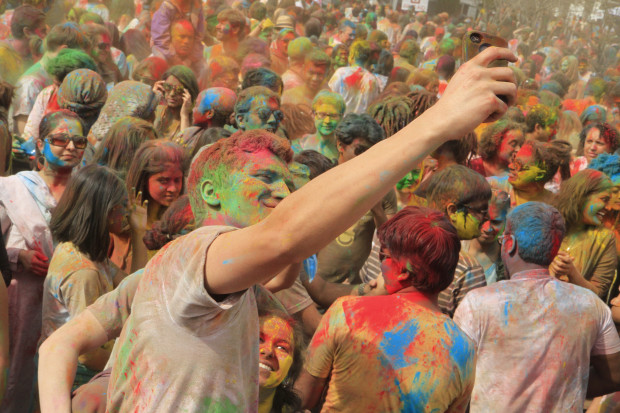You have no items in your cart. Want to get some nice things?
Go shopping
We all knew the childhood devastation of not being allowed to go to your friend’s house after school. It hit you at the core of your happiness. You didn’t want to miss out on the inevitable fun – you wanted to play with your friends, simple. Now, as teens and adults, this childhood trait is looming over us as we yet again are experiencing FOMO, fear of missing out, part 2 – the grand finale, ending in anxiety and depression. We are desperately trying to ensure we don’t miss anything. Be it a social event, a tv show, a new song, anything. We are unable to not be involved in something that everyone you seem to know is a part of. Social media exposes this reincarnation of our childhood, but the focus has changed slightly. It is no longer about missing out on the fun, but about the feeling of isolation, knowing that your friends are having a great time without you, or more to the point, that they are posting about it all over social media for the world to see, and you’re not involved. FOMO has pierced an infantile feeling and has morphed it into anxiety, envy and worry. I spoke to a few people of different ages to gather some ideas about how we view social media and how they regard things that people post. From what I collected, the majority feel that social media plays a large and negative role in spurring on FOMO. Social media heightens FOMO.
Our presence on social media is a continuous source of angst. We feel we haven’t truly done something unless it’s plastered over each of our accounts. Some, to the extent that their every move must be strictly documented. Hey, look, I got out of bed this morning. Hey, look at what I had for breakfast, and for a snack, and for lunch, and for another snack, and for dinner. It’s obsessive and although it feels unnatural, it is normal for us now. It’s almost as if we are on an agonising long-term series of Big Brother. We expose ourselves wilfully, hoping we’ll get a few ‘likes’ or comments in the process, as we feel our actions need to be validated and seen publicly in order to actually exist. We aren’t confident in our decisions or ourselves; we feel we need daily acceptance and validation of every thing we do. The tricky part is that we don’t post absolutely everything, we carefully filter our lives, posting the things we want people to know, causing others to think our lives far more interesting than they actually are, which further fuels the desperate cycle of jealousy, anxiety and leads to more obsessive posts. Everyone is guilty of positive self-representation, and I wonder how much we are really aware of this. Do we purposefully omit the negative or not-so-interesting parts of our lives? Or is it just a given that we don’t share these kind of things because people don’t care about the mundane things? We are show-offs, displaying private gifts from loved ones, telling everyone all about our fantastic achievements, writing long and intimate public essays to our friends, sharing how much weight we’ve lost, and the worst, sharing every selfie we’ve ever taken day in day out.
Our needy habit causes others to feel lonely. The pressure of needing to appear busy makes us worry that we don’t do enough, or at least not enough as these people posting their hectic, amazing lives over social media. It starts to create anxiety that you need to do more and post more because your friends are posting things without you. For many, lack of posts or absence on social media is worrying, as we feel it isn’t great for our street cred or our self-esteem. This goes farther than we think, as now it seems that people are merely doing things to post it on social media. I was amazed when one of the social-media loving teenagers I spoke to told me that people actually only meet up with people to appear busy and popular. Long gone are the days of just meeting someone for coffee without the need to tell everyone. In February, University of Missouri-Columbia published a study finding, ‘Facebook use can lead to symptoms of depression if the social networking site triggers feelings of envy among its users.’ Margaret Duffy, a professor and chair of strategic communication at the MU School of Journalism said in the research, “Facebook can be a very positive resource for many people, but if it is used as a way to size up one’s own accomplishments against others, it can have a negative effect. It is important for Facebook users to be aware of these risks so they can avoid this kind of behavior when using Facebook.” Avoiding this kind of behaviour is far more difficult than we appreciate. We see people accomplishing things and doing exciting stuff and of course we think, oh that’s great, what am I doing? It’s natural.
This competitive streak social media encourages filters into everyday life. People are afraid to say they haven’t been somewhere before, or haven’t heard of a new fad. Jimmy Kimmel’s Lie Witness News hilariously and painfully confronts this face on, filming people pretending to know all about something that never happened. We all want to be in the loop; we want to know everything that we feel societal pressure to know about. Acronyms like YOLO that are imprinted on Facebook posts, clothes and brains further increase pressures to follow the trend of doing what everyone else does. The use of YOLO, you only live once, for example, further pressurizes people to conform to this over-sharing. It’s another reason for people to post on social media that they are living their life and having a great time.
We aren’t living in the present, we are always thinking of being elsewhere, doing other things, neglecting to realise that what we are doing is also important and is also valid. Spending a day doing barely anything is normal, but it has been made into a rarity and a pitiful day through over-sharing on social media. It’s almost like a popularity contest. Who can post the most posts in one day? Who is having the best day ever today? Pick me! Pick me! Look at what I’ve been doing! FOMO is becoming an increasing problem, and although we all laugh at it and think it’s a bit ridiculous, we need to understand that it is deeper than it seems. We are envious, aggressive, jealous, depressed and lonely because of it, and social media only heightens it. Of course we feel like we’re missing out, when advertising plays a large role in social media. We are constantly told outright that we are missing out on things. It is so easy now to see that you’re missing out due to technology and social media, we can’t help it. But it doesn’t have to be a negative thing. After all, it pushes us to do things, to be active and social. It makes us appreciate companionship with friends, but perhaps we need to look at it differently, take everything posted with a pinch of salt. Conforming to this social media sharing shows that we all do have FOMO, and we’re following a trend, so maybe we aren’t missing out after all.

About Isabel Gonzalez-Prendergast
Isabel is particularly interested in international literature, learning about different cultures and philosophies.




